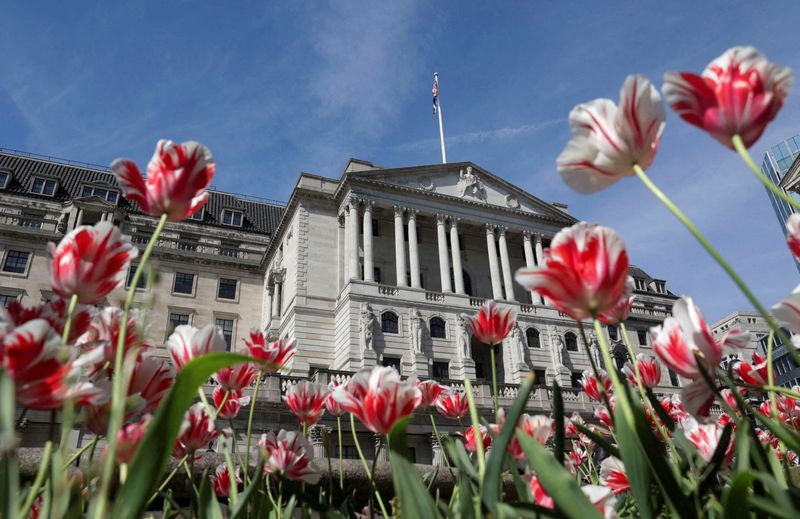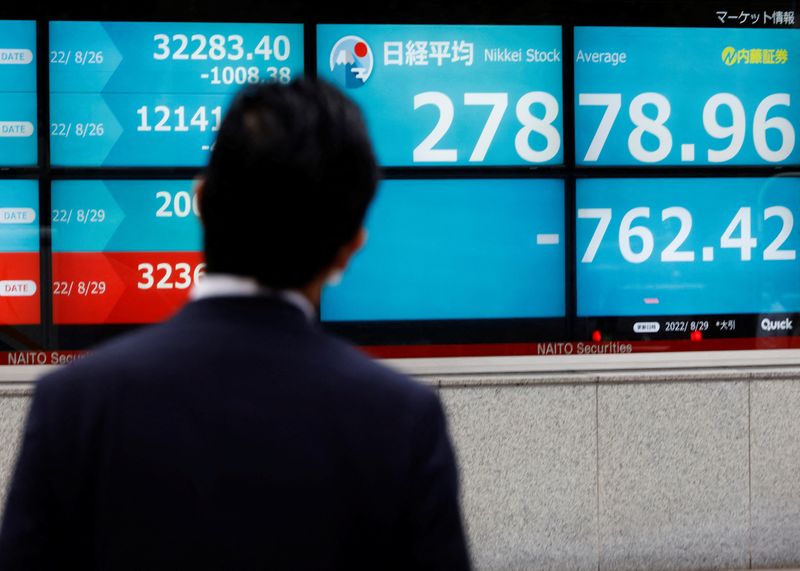By Marc Jones
LONDON (Reuters) - World stocks were taking a well-earned breather on Thursday after a strong few weeks and ahead of a Bank of England rate decision, while Japanese authorities ratcheted up intervention talk again as the yen continued to backslide
After two straight record closing highs, the pan-European STOXX 600 fluttered 0.1% lower (EU) although there was action in Spain where bank Sabadell's 12 billion euro ($12.87 billion) courtship by rival BBVA (BME:BBVA) suddenly turned hostile.
The region's bond and FX markets meanwhile were happy to take it easy ahead of the day's big event - the Bank of England's 1100 GMT interest rate decision, where it is widely expected to leave UK rates at 5.25%, where they’ve been since August.
With new forecasts coming out too and a post meeting press conference there will be plenty to chew over.
PIMCO economist Peder Beck-Friis said BoE chief Andrew Bailey was unlikely to give a clear signal on exactly when the bank's first cut since 2020 might come, but focus will be on what guidance he does give and if more than one ratesetter votes for a cut this time around.
"We know from history that policy meetings may create some volatility," Beck-Friis said.
"What is also interesting is that we have come from a few years where monetary policy has been very correlated globally... but as the pandemic shocks fade I think it is natural that we see some divergence," he added, pointing to how Sweden and Switzerland had already cut rates whereas the United States might need to wait longer.
Overnight in Asia, Chinese trade data and some property market developments had helped Chinese stocks continue their recent outperformance. MSCI's dollar-denominated China index has jumped more than 13% over the last two months.
Customs figures showed that China's imports jumped 8.4% in April from a year earlier, beating expectations for a rise of 4.8%, while exports returned to growth, meeting forecasts, in a boost to economic growth.
That helped Chinese shares build on earlier gains, with blue-chip stocks ending up almost 1% and Hong Kong's Hang Seng index increasing 1.2%. News that China's eastern metropolis Hangzhou will lift all home purchase restrictions in the ailing property sector, a key pillar of domestic demand, also boosted sentiment.
Property shares surged 2.5% as a result.
"For imports, strength was heavily concentrated in a few categories. The main theme in our view is the goal to compete in the AI race," said Lynn Song, chief economist, Greater China, at ING, adding that imports of data-processing equipment and integrated circuits have been strong.
"Considering import demand could remain resilient but exports face a higher level of risk in coming months, we expect a smaller contribution from trade to (economic) growth starting in the second quarter."
In other markets, Japan's Nikkei reversed earlier gains to be off 0.2%. Australia's resources-heavy share market lost 1.1% while South Korea also retreated 1%.
Nasdaq and S&P 500 stock futures eased 0.2%, dragged lower by Uber (NYSE:UBER), which fell 5.7% overnight as the ride-sharing company issued a downbeat forecast after a surprise quarterly loss. [.N]
BACKSLIDING YEN
The Japanese yen dribbled down to 155.85 per dollar in a fourth day of falls. It rose more than 3% last week with market participants pointing to likely intervention by Japanese authorities twice to stem its fast decline. [FRX/]
Japan's top currency diplomat Masato Kanda had said overnight there was no limit for reserves in currency intervention, keeping traders on edge, while minutes from the Bank of Japan's April meeting also showed policymakers had turned overwhelmingly hawkish.
New data however showed that Japan's real wages fell 2.5% in March from a year earlier, marking the second year of decline, an argument for policymakers to not hike aggressively.
Analysts at Brown Brothers Harriman said that the dollar-yen rate was now "extremely overvalued" but that it was also "justified" due to the two countries' real long-term interest rate differentials.
"We estimate long-term fundamental equilibrium for USD/JPY at 95.00, implying a 62% overvaluation relative to the current spot rate," BBH's Elias Haddad said.
In the Treasuries market, yields were little changed after edging up the day before, with movement likely to be muted ahead of the U.S. inflation report next week. Two-year yields held at 4.8511%, while the 10-year yield was at 4.5062%, having risen 3 basis points overnight to 4.4920%.
Among the main commodities, oil prices nudged higher having bounced off two-month lows the previous session. Brent futures rose 0.4% to $83.91 a barrel, while U.S. crude gained 0.5% to $79.40 a barrel. [O/R]

Gold prices were 0.3% higher at $2,316.23 per ounce.
($1 = 0.9323 euros)
